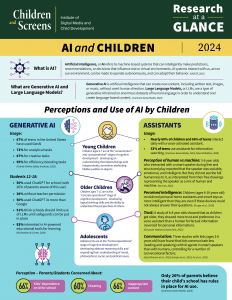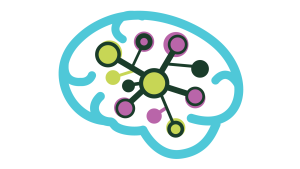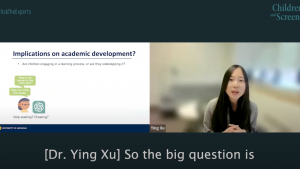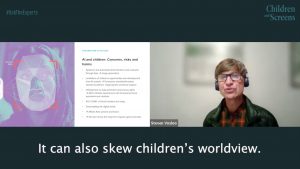 How are children across developmental stages using and perceiving AI? What skills are important for developing AI literacy in youth? How are programs like ChatGPT affecting students’ schoolwork? How is AI influencing children’s understanding of the world around them?
How are children across developmental stages using and perceiving AI? What skills are important for developing AI literacy in youth? How are programs like ChatGPT affecting students’ schoolwork? How is AI influencing children’s understanding of the world around them?
Children and Screens’ Research-at-a-Glance on “AI and Children” provides a quick, printable, and accessible resource with current and quality research on children’s perceptions and use of AI.
Aeschlimann, S., Bleiker, M., Wechner, M., & Gampe, A. (2020). Communicative and social consequences of interactions with voice assistants. Computers in Human Behavior, 112, 106466. https://doi.org/10.1016/j.chb.2020.106466
Caliskan, A. (2023). Artificial intelligence, bias, and ethics. In Proceedings of the Thirty-Second International Joint Conference on Artificial Intelligence, 7007-7013. https://doi.org/10.24963/ijcai.2023/799
Common Sense Media. (2019). The Common Sense Census: Media Use by Tweens and Teens. www.commonsensemedia.org/research/the-common-sense-census-media-use-by-tweens-and-teens-2019
Common Sense Media. (2023). Parents and students are optimistic about AI, but parents have a lot to learn to catch up to their kids – and want rules and ratings to help them. https://www.commonsensemedia.org/sites/default/files/featured-content/files/common-sense-ai-polling-memo-may-10-2023-final.pdf
Druga, S., Williams, R., Park, H. W., & Breazeal, C. (2018, June). How smart are the smart toys? Children and parents’ agent interaction and intelligence attribution. Proceedings of the 17th ACM conference on interaction design and children, 231-240. doi.org/10.1145/3202185.3202741
Family Online Safety Institute. (2023). Generative AI: Emerging Habits, Hopes, and Fears. www.fosi.org/policy-research/emerging-habits-hopes-and-fears
Gampe, A., Zahner-Ritter, K., Müller, J. J., & Schmid, S. R. (2023). How children speak with their voice assistant Sila depends on what they think about her. Computers in human behavior, 143(12), 107693. https://doi.org/10.1016/j.chb.2023.107693
Girouard-Hallam, L. N., & Danovitch, J. H. (2022). Children’s trust in and learning from voice assistants. Developmental Psychology, 58(4), 646–661. https://doi.org/10.1037/dev0001318
Internet Matters. (2020). Living the future: The technological family and the connected home. https://www.internetmatters.org/wp-content/uploads/2020/10/Internet-Matters-Living-For-The-Future-Report.pdf
Lee, V. R., Pope, D., Miles, S., & Zárate, R. C. (2024). Cheating in the age of Generative AI: A high school survey study of cheating behaviors before and after the release of chatgpt. Computers and Education: Artificial Intelligence, 7, 100253. https://doi.org/10.1016/j.caeai.2024.100253
Liang, W., Yuksekgonul, M., Mao, Y., Wu, E., & Zou, J. (2023). GPT detectors are biased against non-native English writers. Patterns, 4(7). https://doi.org/10.1016/j.patter.2023.100779
Michaelson, E. & Carter, N. (2024). The 2024 K–12 Administrator AI Report: Perceptions, Practices, and Potential. Imagine Learning. https://www.imaginelearning.com/wp-content/uploads/2024/01/IL-Admin-Perspective-AI-Survey-Report.pdf
Ranard, B. L., Park, S., Jia, Y., Zhang, Y., Alwan, F., Celi, L. A., & Lusczek, E. R. (2024). Minimizing bias when using artificial intelligence in critical care medicine. Journal of Critical Care, 82, 154796. https://doi.org/10.1016/j.jcrc.2024.154796
Su, J., & Yang, W. (2023). Artificial Intelligence and Robotics for Young Children: Redeveloping the Five Big Ideas Framework. ECNU Review of Education, 0(0). https://doi.org/10.1177/20965311231218013
UNICEF. (2021). Policy guidance on AI for children. https://www.unicef.org/globalinsight/media/2356/file/UNICEF-Global-Insight-policy-guidance-AI-children-2.0-2021.pdf
Vicente, L., & Matute, H. (2023). Humans inherit artificial intelligence biases. Scientific Reports, 13(1), 1–13. https://doi.org/10.1038/s41598-023-42384-8
Xu, Y., & Warschauer, M. (2020). What are you talking to? Understanding children’s perceptions of conversational agents. Proceedings of the 2020 CHI conference on human factors in computing systems, April 25–30, 2020, ACM, Honolulu, HI. https://doi.org/10.1145/3313831.3376416
Xu, Y., Wang, D., Collins, P., Lee, H., & Warschauer, M. (2021). Same benefits, different communication patterns: Comparing Children’s reading with a conversational agent vs. a human partner. Computers & Education, 161, 104059. https://doi.org/10.1016/j.compedu.2020.104059





